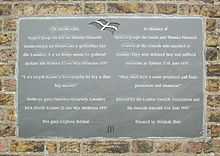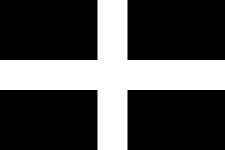Michael An Gof

Michael Joseph (better known as Michael An Gof, where An Gof is Cornish for "blacksmith"; died 27 June 1497[1]) and Thomas Flamank (a Bodmin landowner's son and London lawyer) were the leaders of the Cornish Rebellion of 1497.
The rebels marched on London to protest at King Henry VII's levying a tax to pay for an invasion of Scotland in retaliation for the Scots' support for the pretender Perkin Warbeck. The Cornish believed that this was a northern affair and had nothing to do with them; they also believed that the tax was the work of the King's corrupt counsellors and marched to London to bring this to the King's attention.
They were hopeful of gaining support from people in Kent – the focus of Jack Cade's rebellion of 1450 – but despite heading to Cade's former rallying site at Blackheath they gained little backing.
As a result, the Cornish rebels were beaten by the King's forces at the Battle of Deptford Bridge on 17 June 1497 on a site adjacent to the River Ravensbourne. Michael fled to Greenwich after the battle, but was captured and sent to the Tower of London.
As one of the leaders, Michael An Gof was executed with Flamank on 27 June 1497. Deemed to be traitors, they were hanged, drawn and quartered at Tyburn and their heads displayed on pike-staffs on London Bridge. Just before his execution, An Gof is recorded to have said that he would have "a name perpetual and a fame permanent and immortal".
In 1997, the 500th anniversary of the rebellion, a commemorative march ("Keskerdh Kernow 500") was held, retracing the route of the original march from St. Keverne (An Gof's home town in Cornwall) to London. A statue depicting An Gof and Flamank was unveiled in St Keverne and a commemorative plaque was unveiled on Blackheath common.
Other uses
An Gof's name was later used by a Cornish nationalist extremist organisation.[2]
The Holyer An Gof trophy is an annual award for the best publication on Cornwall,[3] and part of the Cornish Gorsedd (Gorsedh Kernow).
The name is the origin of the British surname Angove.[4]
See also
- List of topics related to Cornwall
- Second Cornish Uprising of 1497
- Prayer Book Rebellion
- The Wikipedia Cornwall Portal
References
- ↑ "Michael An Gof, the Cornish Blacksmith". cornwall-calling.co.uk. Retrieved 11 November 2014.
- ↑ http://www.thesun.co.uk/article/0,,2-2007130841,00.html
- ↑ Holyer An Gof Award
- ↑ "Surname Database: Angove Last Name Origin". The Internet Surname Database. Retrieved 11 November 2014.
External links
- Mychal Josef an Gof "The Smith"
- The Battle of Deptford Bridge (Blackheath) 1497
- The Cornish Rebellion
- "A name perpetual and a fame permanent and immortal"
- The Black Heath Rebellion
- The Black Heath Rebellion, 16 June 1497
- Michael An Gof, the Cornish Blacksmith
- Michael Joseph
- 1997 Keskerdh Kernow 500
| |||||||||||||||||||||
| ||||||||||||||||||||||||||||||||||||||||||||||||||||||||
